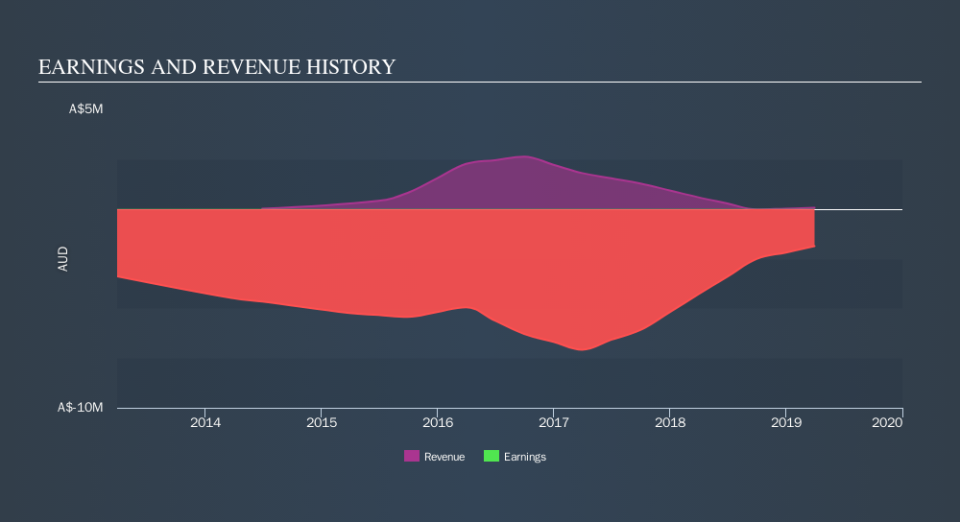Do Directors Own Amplia Therapeutics Limited (ASX:ATX) Shares?

If you want to know who really controls Amplia Therapeutics Limited (ASX:ATX), then you'll have to look at the makeup of its share registry. Insiders often own a large chunk of younger, smaller, companies while huge companies tend to have institutions as shareholders. I quite like to see at least a little bit of insider ownership. As Charlie Munger said 'Show me the incentive and I will show you the outcome.
With a market capitalization of AU$4.3m, Amplia Therapeutics is a small cap stock, so it might not be well known by many institutional investors. In the chart below below, we can see that institutions don't own many shares in the company. Let's take a closer look to see what the different types of shareholder can tell us about ATX.
See our latest analysis for Amplia Therapeutics
What Does The Lack Of Institutional Ownership Tell Us About Amplia Therapeutics?
Small companies that are not very actively traded often lack institutional investors, but it's less common to see large companies without them.
There are many reasons why a company might not have any institutions on the share registry. It may be hard for institutions to buy large amounts of shares, if liquidity (the amount of shares traded each day) is low. If the company has not needed to raise capital, institutions might lack the opportunity to build a position. On the other hand, it's always possible that professional investors are avoiding a company because they don't think it's the best place for their money. Amplia Therapeutics might not have the sort of past performance institutions are looking for, or perhaps they simply have not studied the business closely.
Amplia Therapeutics is not owned by hedge funds. As far I can tell there isn't analyst coverage of the company, so it is probably flying under the radar.
Insider Ownership Of Amplia Therapeutics
The definition of an insider can differ slightly between different countries, but members of the board of directors always count. Company management run the business, but the CEO will answer to the board, even if he or she is a member of it.
Most consider insider ownership a positive because it can indicate the board is well aligned with other shareholders. However, on some occasions too much power is concentrated within this group.
Our most recent data indicates that insiders own a reasonable proportion of Amplia Therapeutics Limited. Insiders own AU$1.1m worth of shares in the AU$4.3m company. This may suggest that the founders still own a lot of shares. You can click here to see if they have been buying or selling.
General Public Ownership
The general public, who are mostly retail investors, collectively hold 59% of Amplia Therapeutics shares. This size of ownership gives retail investors collective power. They can and probably do influence decisions on executive compensation, dividend policies and proposed business acquisitions.
Private Company Ownership
Our data indicates that Private Companies hold 13%, of the company's shares. Private companies may be related parties. Sometimes insiders have an interest in a public company through a holding in a private company, rather than in their own capacity as an individual. While it's hard to draw any broad stroke conclusions, it is worth noting as an area for further research.
Next Steps:
I find it very interesting to look at who exactly owns a company. But to truly gain insight, we need to consider other information, too.
Many find it useful to take an in depth look at how a company has performed in the past. You can access this detailed graph of past earnings, revenue and cash flow.
Of course, you might find a fantastic investment by looking elsewhere. So take a peek at this free list of interesting companies.
NB: Figures in this article are calculated using data from the last twelve months, which refer to the 12-month period ending on the last date of the month the financial statement is dated. This may not be consistent with full year annual report figures.
We aim to bring you long-term focused research analysis driven by fundamental data. Note that our analysis may not factor in the latest price-sensitive company announcements or qualitative material.
If you spot an error that warrants correction, please contact the editor at editorial-team@simplywallst.com. This article by Simply Wall St is general in nature. It does not constitute a recommendation to buy or sell any stock, and does not take account of your objectives, or your financial situation. Simply Wall St has no position in the stocks mentioned. Thank you for reading.

 Yahoo Finance
Yahoo Finance 

